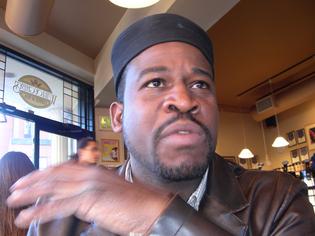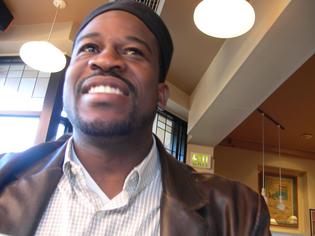 In a year when shootings left New Haveners feeling despair about how to address youth violence, Dixwell beat cop Shafiq Abdussabur offered inspiration. How he got to be a cop — and in a position to make a difference — offers another inspiring tale, about how to build a true “community policing” force.
In a year when shootings left New Haveners feeling despair about how to address youth violence, Dixwell beat cop Shafiq Abdussabur offered inspiration. How he got to be a cop — and in a position to make a difference — offers another inspiring tale, about how to build a true “community policing” force.
The 39-year-old former high-school track star patrols Dixwell, the neighborhood where he grew up. He saw up close how younger and younger kids were increasingly using guns to settle disputes. He saw the impact it was having on families. He saw how little kids had to do. So on his off hours he started a program for young teens he saw at risk of being lured into long-term trouble. He took them camping. He brought them to jail, too. He invited cops and former gang-bangers and addicts for lessons about real life.
This year the program took off; 55 boys spent the summer in Abdussabur’s CTRibat program. And they stayed out of trouble. Their stretch of town stayed quieter than other crime-plagued neighborhoods. By year’s end, the whole city noticed. The city government and other major institutions came through with money to expand CTRibat; a new program teaching teens video is starting up at the Stetson Branch Library.
Click here and here to read about some of what Abdussabur did with the kids this year. Click here to read about the results. The big picture: Yes, you can reach kids from tough homes in tough neighborhoods, You can make their lives, and the whole city, safer.
Abdussabur’s intiative is a textbook case of community policing, of cops who know their neighborhoods, who know the people in them, who work with other groups on solutions that don’t require arresting poeple.
Abdussabur’s route to becoming a cop, on the other hand, is anything but a classic case. Entrepreneur, artist, activist protesting the cops — people fitting those descriptions don’t usually end up wearing the badge. Maybe, as New Haven recruits new cops and struggles to return to the roots of its community policing effort, it may consider returning to such unconventional ideas about who’s part of “us” and who’s part of “them.”
Mom Was A Panther
 Abdussabur’s earliest view of activists and cops came from the shoulders of his mother’s friend.
Abdussabur’s earliest view of activists and cops came from the shoulders of his mother’s friend.
Abdussabur — his name then was Tommy Fulcher Johnson — couldn’t have been older then 4 or 5. His mom, Brenda Johnson, took him to the Green for a Black Panther rally. She worked as an aide in the public schools. She also belonged to the Panthers, a group calling for armed revolution in America.
“I remember being hoisted upon [her friend’s] shoulders and seeing all these leather hats and jackets — like I have on now, only black — and seeing all these cops lined up with German shepherds,” Abdussabur recalled in a conversation at his unofficial Church Street office, Willoughby’s coffee shop.
He still visibly recalled the tension he felt as police charged at the protesters. His mother grabbed him, and they took off. “We ran from the mall all the way to Edgar Street,” their home in the Hill. Abdussabur remembered sitting with his mom on their front porch later that afternoon. He remembered the tension, again, as a cop drove by, “in slow motion, definitely looking.”
The family moved to Florence Virtue Homes in Dixwell, where Abdussabur spent most of his childhood. He went to St. Aedan’s parochial school. Afternoons were spent at grandma’s (mom and dad, a postal employee, were working) or with friends drawing pictures from books at Stetson on Dixwell Avenue. Abdussabur said he’d get in a little trouble at school, but not much. He blossomed at Notre Dame High School, where he made all-state on the track team and won a state Congressional Art Award for an acrylic painting.
That award won him a full scholarship to the Rhode Island School of Design. But he chose instead to accept a track scholarship to The University of West Georgia in Carrollton, Georgia, where he studied architecture, interior design, and philosophy.
Schooled in Real Life
In his freshman year at the largely white Southern school, Abdussabur found himself selected as president of the Black Student Alliance. He also became head of a black fraternity, and organized the first joint Greek Week involving white and black fraternities. Brenda Johnson’s son was finding his voice.
“I started getting called to the dean’s office. He wanted to know what would make a ‘Yankee come down to be so concerned about what was happening down here.’”
He continued butting heads with the administration over unspent budgeted money for the alliance, then over a shantytown he organized to protest the school’s investments in apartheid South Africa. White students were joining in the protest. The president asked Abdussabur to remove the structure, since the school was simultaneously holding an open house for prospective students.
“If you give me a letter that you’re willing to divest, we’ll take it down,” Abdussabur replied.
No deal. The protests continued. Cops started hassling the protesters. Weeks later, the school divested from South Africa.
And a black administrator called Abdussabur in for a chat. “I’ll never forget it. He said, ‘When you’ve got your hand in the lion’s mouth, be careful not to tickle his palate.”
On a trip back home, Abdussabur hooked up with activist Scot X Esdaile and started attending a Nation of Islam mosque in Bridgeport. “I was searching for religion. I had studied black history. I had on the Malcom X overcoat, the hat, the bowtie.”
Soon after, in his junior year, Abdussabur’s paperwork for his scholarship mysteriously went “missing.” When the office found them, it was too late, he was told, for him to qualify for the money. He had no dough to stay in school.
Bold Minds
He invested some of his last $400 in equipment to carve wood medallions with nationalist themes — “Africa, Nefertiti heads. He formed a company called Bold Minds to sell the medallions. Within three years, traveling in the south and on the East Coast, he sold 10,000 pieces.
He also traveled to Atlanta, where he served in a police job of sorts — the Fruit of Islam, the Nation’s stone-faced security force.
He was also traveling back home, where his mom was ill. He eventually settled back in New Haven. And he decided to leave the Nation of Islam. “I was trying to find a religion that did not make color a factor,” he recalled. “No matter how you sliced it, NOI, color was a central factor. In Georgia, [many of] my allies and mentors were white.”
One day he attended a fund-raiser for New Haven’s Masjid al-Islam, which is affiliated with Orthodox Sunni Islam.
“I saw all these Indians and Pakistanis and African-Americans and white people. I said, ‘There’s going to be a fight!’
“I look at the door. There was no security!
“I was amazed — all these people could be in a room, different cultures, eating together.” Abdussabur was sold.
He joined up with the masjid. He adopted his current name: Shafiq, for “compassionate,” and Abdussabur, for “servant of God.”
The members of the George Street masjid, near the Hospital of St. Raphael, noticed that their neighbors on nearby Greenwood Street were basically living hostage to drug dealers on their block. They couldn’t get the cops to take action. So Abdussabur and other masjid members formed their own patrols to confront the dealers head on. They also confronted the cops, protesting their lack of response.
Abdussabur further confronted the cops, publicly, when he and activist Michael Jefferson formed an All-Civilian Review Board to monitor police brutality. It was the mid-‘90s, the dawn of community policing in New Haven, when then-Chief Nicholas Pastore was looking in unusual places — gay and lesbians newspapers, universities, black and Hispanic publications — to build a force built on a new model. Pastore called Abdussabur in for a chat. Why don’t you become a cop? he sugggested.
A Deserted “Ave.”
Abdussabur took the suggestion. He’s glad he did. He likes patrolling his old neighborhood.
He’s also busy outside of patrol, selling his artwork, organizing his youth program. He lives in Beaver Hills with his wife, Mubarakah Ibrahim, and their four children. They remain active in the George Street masjid. Abdussabur prays five times a day. A gregarious man prone to big-grin outbursts, he never stops running, or cooking up new projects.
Closest to his heart is CTRibat, which in his view is part of being a cop.
He recalled a camping trip to Rock Neck State Park with his kids in late July. “I kept asking myself: Is this campaign thing working?”
One of the boys had been known to carry guns in the neighborhood; his family was in and out of jail. “I overheard him talking to another of the young boys: ‘I like this. I don’t never wanna go back home. The Tribe is corny. All we do is go to the store and hang out on the Ave. Go to the store, hang out on the Ave.’” (The boy signed up for an after-school football program this fall and has stayed out of trouble, according to Abdussabur.)
The trip ended with Abdussabur and the kids pulling into Dixwell in a borrowed Police Athletic League van around 3 p.m.
“It had to be 97 degrees. They said, ‘Shafiq, drive by the Ave.’ I said, ‘Can’t you guys give it up?’”
He thought they wanted to show off for their friends hanging out at Dixwell Plaza. He drove by, reluctantly. “They said, ‘Where everybody at?’ Nobody was hanging out. I said, ‘Because you’re all in the car.’”
That’s when Abdussabur knew: “We had ‘em.” The “root element” wasn’t hanging out.
(To read about some other Hometown Heroes of 2006, click here, here, here, here, here, and here.
(To read other installments in the Independent’s “Cop of the Week” series, click here, here, here, here, here, here, here, here, here, here, here, here, here, here, and here.)



YAY Shafiq! I am proud to say that he was my art teacher at the Dixwell Art Center, years ago (and his wife is my personal trainer).
He really does deserve a reward for all of the great work he is doing.